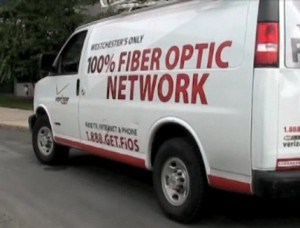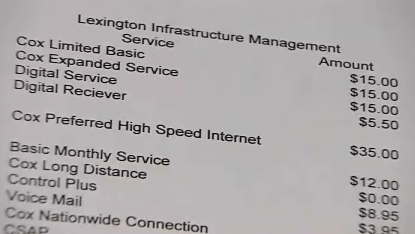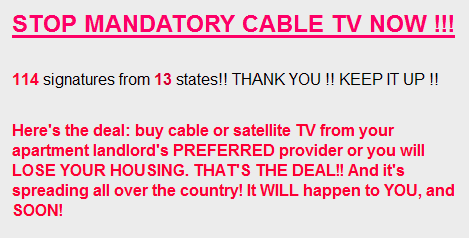 [Update: See our updated piece with important new details about how to great the best possible deal from Time Warner Cable.]
[Update: See our updated piece with important new details about how to great the best possible deal from Time Warner Cable.]
Your cable bill now exceeds your electric and landline phone bill combined. You’ve dropped the multiple premium channels, dumped the extra add-ons like Road Runner Turbo and even considered turning in your DVR box. But your bill after the 2011 rate increase is still sky high.
Stop the Cap! has spent the last week working with several Time Warner Cable customers looking for a better deal from the nation’s second largest cable company. It was a learning experience for all of us, with different “best offers” extended to different customers, deals some employees insisted simply weren’t available… until they were, and confusion galore as employees had to navigate their way around corporate roadblocks.
The good news: The quality of customer service from most Time Warner employees we worked with was generally excellent — professional, generally helpful, and even irritated when they couldn’t get some of the best deals in place for customers. The bad news: As Time Warner moves more towards a regional corporate bureaucracy, new rules and pre-conditions frustrate all concerned.
When it comes to this cable company, the less business you give them, the better the offers.
As Scott, our reader in Brighton, N.Y., tweeted to Time Warner: “It would be nice to toss your longtime customers a bone now and again.”
Step One: Review Your Bill
The first way to save is to scrutinize your current bill. Know what you are paying and consider dropping services you no longer use. Most Time Warner customers purchase a bundle of two or three services, usually cable-TV and broadband. The Watch N Surf bundle in the Rochester area now runs $118.99 per month. Below the bundle (shown in bold on the bill) are breakdowns of equipment charges — set top boxes and remote controls, and add-ons such as movie channels or Road Runner Turbo.
Before Time Warner Cable will authorize a lower price, expect them to question any add-ons, such as premium movie channels or Turbo. They’ll attempt to get you to drop services before they’ll extend a deal. We found it more difficult to convince the company to give price breaks to customers who subscribe to a number of extra services and want to keep them.
Be prepared to temporarily drop services if you want the best possible deal. You can always add them back later.
Step Two: Prune Your Package
Think carefully about the services you are getting. Are you still watching premium movie channels these days or downloading your movies from Netflix or other services? A few years ago, Time Warner only charged $7 a month for each additional premium channel. Now that price has nearly doubled in many areas. Are you really watching them enough to make the price worthwhile? At upwards of $13.95 per month — $167 a year, it may be time to ditch them.
Time Warner told us subscribers routinely confuse the “Digital HD Tier” with the cable company’s standard HD channels. The package, priced at $4.99 in most areas, is on many customers’ bills because it used to include HDNet and HDNet Movies, two of the earliest HD channels a number of early HDTV set owners craved. The company dropped both networks more than a year ago, replacing them with Smithsonian and the improbable RFD-TV. The latter channel has no business in a premium-priced package — it’s like charging you extra to receive C-SPAN 3. If you can do without those channels as well as MGM HD and Universal HD — you just saved $60 a year. Time Warner does not charge extra for other HD channels.
Some Time Warner customers also have several set top boxes they originally got for free or at a discount. Today those boxes run $7 per month. If you have cable in a bedroom or kitchen and can manage with channels 2-99, you can turn in the set top box and save $84 a year per box.
Broadband customers with Road Runner Turbo, now $9.99 per month, may find little value from that add-on in areas where speeds increased in the past year. In Rochester, for example, Road Runner Turbo turns 10/1Mbps service into 15/1Mbps service — hardly much of an improvement and certainly not worth the price. Save the $120 a year for something else.
Step Three: Negotiating a Better Deal
Now that you’ve reviewed your services and pruned your package where necessary, it’s time for Time Warner to do their part and meet you halfway.
Getting the cable company to approve the best possible deal depends on a number of factors:
- How long you have been a customer and how well you pay your bill;
- How serious you are about canceling service;
- How many services you have;
- Who you talk to.
The fewer services you have, the better the deal you can get from Time Warner’s retention department. For example, a recently-ended promotion offered a year of free DVR service — but only for customers who don’t have a DVR box already. If you already have phone, broadband, and cable service from Time Warner, scoring the most aggressive Triple Play promotion was a lot harder than it was for a customer with a single service. But not always. More often than not, deals that were not available from one customer service representative were available from another.
Call your local Time Warner Cable office and request to cancel your service. You want to be transferred to a Retentions Specialist, authorized to extend special deals to departing customers. Ordinary customer service representatives won’t have access to the best deals.
There is no reason to beat around the bush with the representative. Just tell them “it costs too much” when they ask why you want to cancel. You don’t need a sob story. When you focus the representative on the money issue, you won’t have to navigate around their arguments about how bad satellite TV is or why the phone company offer isn’t as good.
The best savings and least red tape are won by new customers. Judging from a few “shopping deal” websites we explored, it isn’t unprecedented for customers to cancel service and sign up under a family member’s name as a new customer. But that method can be a major hassle. Orders cannot be taken until an existing customer schedules a date to disconnect service. Customers will also have to pay installation costs in some areas, and will lose their current Road Runner e-mail accounts. We often found taking this drastic measure was not necessary — some existing customers managed to win deals just one or two dollars greater than a new customer would pay.
Time Warner’s most aggressive current offer is their triple play/$99 month offer, including cable-TV, phone, and Internet service. Equipment costs extra, and that price comes before taxes and fees. Virtually any customer currently taking broadband and cable-TV service can manage to score the $99 price when threatening to cancel service. It also costs nearly $20 less per month than Time Warner’s price for just cable and broadband. If you disconnect your landline, you will save another $20-50 a month and get unlimited long distance calling across North America.
Tweet Your Way to Savings.
Our reader Scott grabbed the $99 offer, and all it really took was a tweet to @TWCableHelp:
@twcablehelp Getting ready to cancel my #timewarnercable and take my $ elsewhere if they want new customers more than old.
After exchanging phone numbers, Scott was talking to a retention agent near Buffalo, N.Y., who secured a deal for him in about 10 minutes.
Time Warner says the national retention team has the keys to some of the best retention deals around — deals the local agents can’t always offer.
We did things the hard way — by phone, talking to multiple representatives, each who pitched us different deals, and rejected or accepted our counteroffers. The diversity in responsiveness surprised us.
We spent time with Gennifer near Buffalo who ended up with a stubborn representative who refused to deal, and the call ended with a scheduled disconnect.
“I am not paying their higher rates,” Gennifer tells us. “I’m switching to Verizon FiOS after this.”
Time Warner insisted she downgrade her add-on services before they would extend a deal her way.
“I am not going to have a cable company tell me what channels and services I should get, especially when the ‘other guy’ is cheaper,” she told us. “They obviously don’t want to keep me as a customer after years with them, so goodbye.”
Just an hour later, we were back on the phone with Time Warner easily scoring the $99 triple play promotion Gennifer couldn’t get, this time for a relative in Rochester, no questions asked.
“It is a great deal and we’re happy to extend it to you,” the representative told us. (Gennifer eventually got that same offer talking to a different representative, but she’s still headed to Verizon FiOS regardless.)
Time Warner’s recently finished “12 months of free DVR service” promotion was much harder to get. Representatives repeatedly told us the offer was not available to customers with existing DVR service, right up until they told us it “sort of was,” with some creative effort and the approval of the right supervisor. Instead of that particular deal, another was offered worth nearly as much, with a one time credit making up the difference. That works for us.
A particularly excellent representative, Tim, has gone all-out working on our account over the past three days trying to keep us happy. Apologizing not less than two dozen times for various frustrations he encountered along the way, he’s still manning the wheel as he navigates around headaches thanks to a somehow-corrupted account and an obstinate Frontier Communications who is stubbornly trying to block the request to switch providers. He continues to impress us as that journey continues, even offering a year of Showtime gratis to make up for all of the inconvenience. Our “out the door” price will be around $132, including Turbo, a DVR box, a HD set-top box, Showtime, and a one time credit of around $25. We were paying around $40 a month more, and will also save another $35 a month dropping our landline from Frontier Communications.
Seeing the back of Frontier Communications.
Time Warner’s willingness to deal gives us the chance to see the back of Frontier Communications, dumping their landline service. In the process, we actually expanded the number of services we are buying from the cable company, and earning the chance to say goodbye to a phone company that has done little for this community in recent years.
When Frontier asked us why we possibly would want to cancel, we unloaded:
- The company’s insistence on Internet Overcharging schemes;
- The fact Frontier’s DSL service is at least a decade behind Time Warner’s broadband speeds;
- Frontier has done nothing for the Rochester area except provide slow and lousy DSL service — satellite TV as a triple-play afterthought doesn’t cut it;
- They charge too much and stick customers on term contracts that are expensive to cancel;
- We don’t have much confidence in Frontier’s long-term future with the ongoing exodus of customers.
Other Deals and Promotions
Not every customer will want a triple-play deal from Time Warner. For those who want cheaper standalone broadband service, we recommend Earthlink’s six month promotion (available on Earthlink’s website), which is billed directly by Time Warner with no equipment changes:
- Standard: (equivalent speed to Road Runner Standard, without PowerBoost): $29.95/month for six months, $41.95/month thereafter;
- Turbo: (equivalent speed to Road Runner Turbo, without PowerBoost): $39.90/month for six months, $51.90/month thereafter.
After six months, switch back to Road Runner. It should run $34.95 a month for the first year on a commonly-seen promotion.
We found a lot less savings for customers trying to lower the price of cable and broadband, without phone. In fact, we found it was actually cheaper to take the bundled offer with phone service than finding a retention deal without it. You are not obligated to use the phone service, of course. They can assign you a new number you may or may not care to use.
Some other promotions to ask about:
- DVR Service: Rent one box at the regular price, get one free. For homes who want two DVR boxes, ask if you can get the second one for free for the first year;
- Road Runner Turbo: This $9.99 add-on can be had for free for one year in some areas. Ask the representative what they can do for you;
- Starz! $25 mail in rebate: Starz! is running a $25 mail-in rebate for new customers who keep the movie channel active for three months;
- Free Showtime: Although not promoted any longer, a year of free Showtime might still be available to those who ask and sign up for the $99 offer;
- Installation/Start Up Costs: Ask for free installation, if you are a new phone customer. You will probably still pay the one-time $20 fee phone customers are charged, but let the cable company install the service for you for free.
If you are uncomfortable with the agent or the offers you are getting, tell them you still want to go ahead and schedule a disconnect. Suggest a date a week in advance. Then, a day later, call back Time Warner and again request to “cancel” service, telling the representative you want to confirm your disconnect date. Often, they are amenable to reopening negotiations at that point. Yesterday’s “no” may turn into today’s “yes.”
Don’t be intimidated if a representative tells you he’s unlikely to get a supervisor to approve a counteroffer you make in response to theirs. Go ahead and tell them to check anyway. More often than not, the supervisor will “surprisingly” approve your request or provide a better offer. If you live in an area with “price protection agreements” and think something better might come along in the next year or two, fight to stay off of one -and- get the retention deal price anyway.
Step Four: Gratitude Expressed
If you got what you called for, be sure to thank the representative and get their name. You might want to drop a message to the president of your local Time Warner Cable office to thank the company and mention the representative that helped you remain a customer. Good employees deserve recognition and in the future, these are the people you will want to talk to when you call about something else.
In the end, it was a hassle to spin the “Wheel of Retention Deals” to see where it landed. It sometimes took multiple calls to get the best deal, and we agree with Scott’s assessment that treating your best customers to the worst deals is not a great way to win customer loyalty. Calling and asking for discounts is a necessary annoyance these days but we’d rather never have to do it. The next step is outright cancellation of services like cable-TV, so Time Warner gets something out of the process as well. We just wished the representatives were given the tools to be more consistent.
As we’ve always said here — we have no complaints about the quality of the local employees who manage and maintain the service we’ve subscribed to for well over a decade. Our beef has been and probably always will be with the corporate decision-makers who conjure up the rate increases, experiments of Internet Overcharging schemes, and other annoyances.


 Subscribe
Subscribe

















